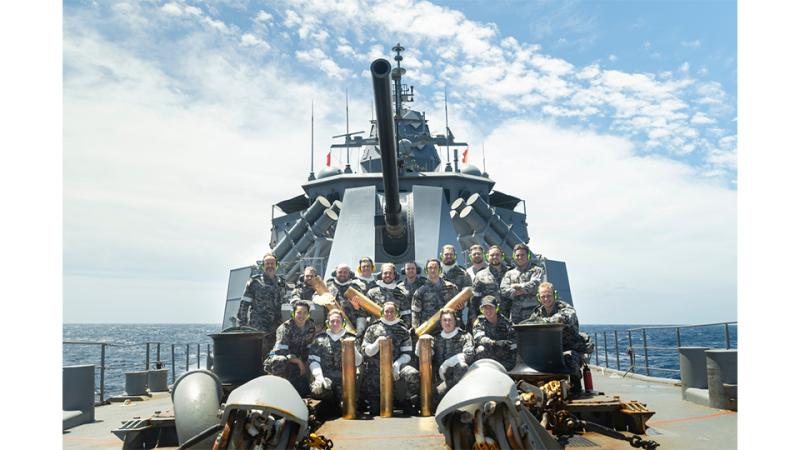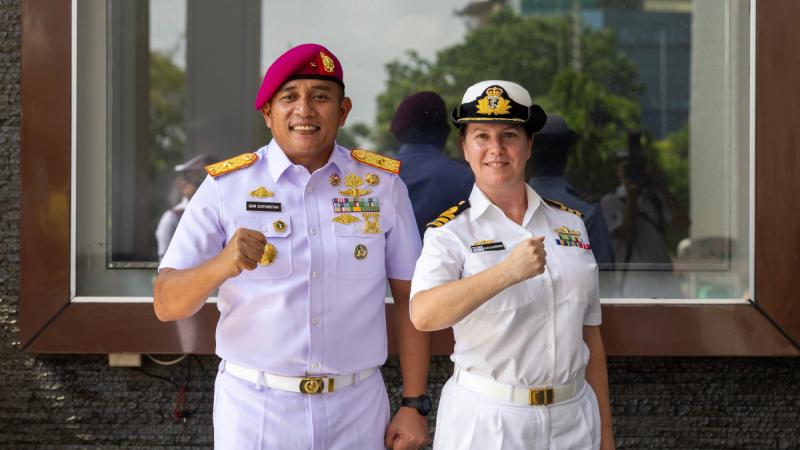12 May 2025
They don’t wear capes or fly jets but Australia’s logistics planners drive every move in the Middle East, where nothing takes off without coordination.
From flights and equipment to forward support teams, they ensure missions stay supplied, connected and ready to respond.
Forward support teams are small, agile groups sent where needed most – delivering logistics, communications, admin and welfare support, such as a padre or psych, to operations across the region.
They operate with usually just two to four members to minimise cost while maximising impact.
When moving sensitive equipment such as weapons or body armour, planners often rely on ACCORDION 6, a contracted civilian aircraft dedicated to Defence missions.
It complements the twice-yearly DWELL (resupply) flight, a C-17 Globemaster run from Australia that delivers bulk freight and rotates critical gear for inspection and servicing.
Logistics operations officer at Headquarters Middle East, Flight Lieutenant James Wilcox, said the Middle East DWELL was a critical capability bridging the air gap between the Middle East and Australia.
“We try to achieve many things whilst we’re in location, but some items need to be rotated out routinely to conduct the required technical inspections or repairs on our equipment,” Flight Lieutenant Wilcox said.
With fewer boots on the ground than in years past, the need for smart logistics and targeted support has never been greater.
He said each task was planned down to the hour, balancing host nation approvals, airspace access and freight limitations to keep everything moving on schedule.
“We identify a mutually feasible support process, then it involves the planning, the personnel, the movements and the logistics functions of the support required,” Flight Lieutenant Wilcox said.
By combining military assets with contracted lift and local procurement, planners can adapt quickly if cargo is delayed, redirected or denied clearance.
Recently, when no Australian air movements operators were available to unload an incoming aircraft, planners turned to coalition partners for support.
By leveraging existing ties with the US Navy on base, they secured a team to complete the task – strengthening relationships while keeping the mission on track.
“This has furthered our relationship with the coalition forces on base, and this interaction has driven an appetite for further cooperation,” Flight Lieutenant Wilcox said.
And while coordination keeps the mission moving, welfare remains just as critical.
For Chaplain Josh Bouzanquet, it’s not just about logistics or planning – it’s about people.
'From time to time troubles come up and for those who need extra encouragement and guidance, that’s why I’m here.'
“The chaplaincy capability is supposed to be informal, very relational and contributes to preventative support mechanisms,” he said.
“From time to time troubles come up and for those who need extra encouragement and guidance, that’s why I’m here.”
As part of the welfare-focused forward support team, Chaplain Bouzanquet has travelled across the Middle East delivering support alongside an ADF psychologist.
Their work forms part of a broader trial to refine chaplaincy and psychological care in line with Head Quarters Middle East’s evolving role, with early results showing promise.
From the trenches of World War 1 to today’s deployments, chaplains have stood alongside soldiers wherever they’re needed most.
“Part of the chaplaincy model of service is to be present where people are doing it toughest – and at the moment, that’s our forward locations across Africa, the Middle East and Europe,” Chaplain Bouzanquet said.
While some support comes through presence and care, others keep operations moving with hands-on expertise.
For Air Force Corporal Dean Jones, a ground support equipment technician, that means maintaining and repairing everything from aircraft loaders and generators to forklifts and start carts.
“If a piece of ground support equipment breaks, it’s my priority to have it repaired before it becomes an impact on capability,” he said.
“Best case scenario is we get approval to source it locally.”
The ground equipment supports the DWELL by providing power on the tarmac for the aircraft and unloads equipment before return to Australia.
To stay ahead, he pre-plans repairs and orders critical parts to arrive on the next DWELL flight.
“That’s what I’ve done for the person who’ll replace me and that’s what was done before I got here – by pre-planning that sets them up for success,” Corporal Jones said.
Earlier in his deployment he assisted the US Navy with a helicopter repair, cutting through titanium bolts and tools to safely remove damaged components.
“I even manufactured a tool so they could continue assembly until the correct part arrived. They were very appreciative of that,” he said.
Together, their work ensures Australia’s operations across the region remain ready for whatever comes next.


